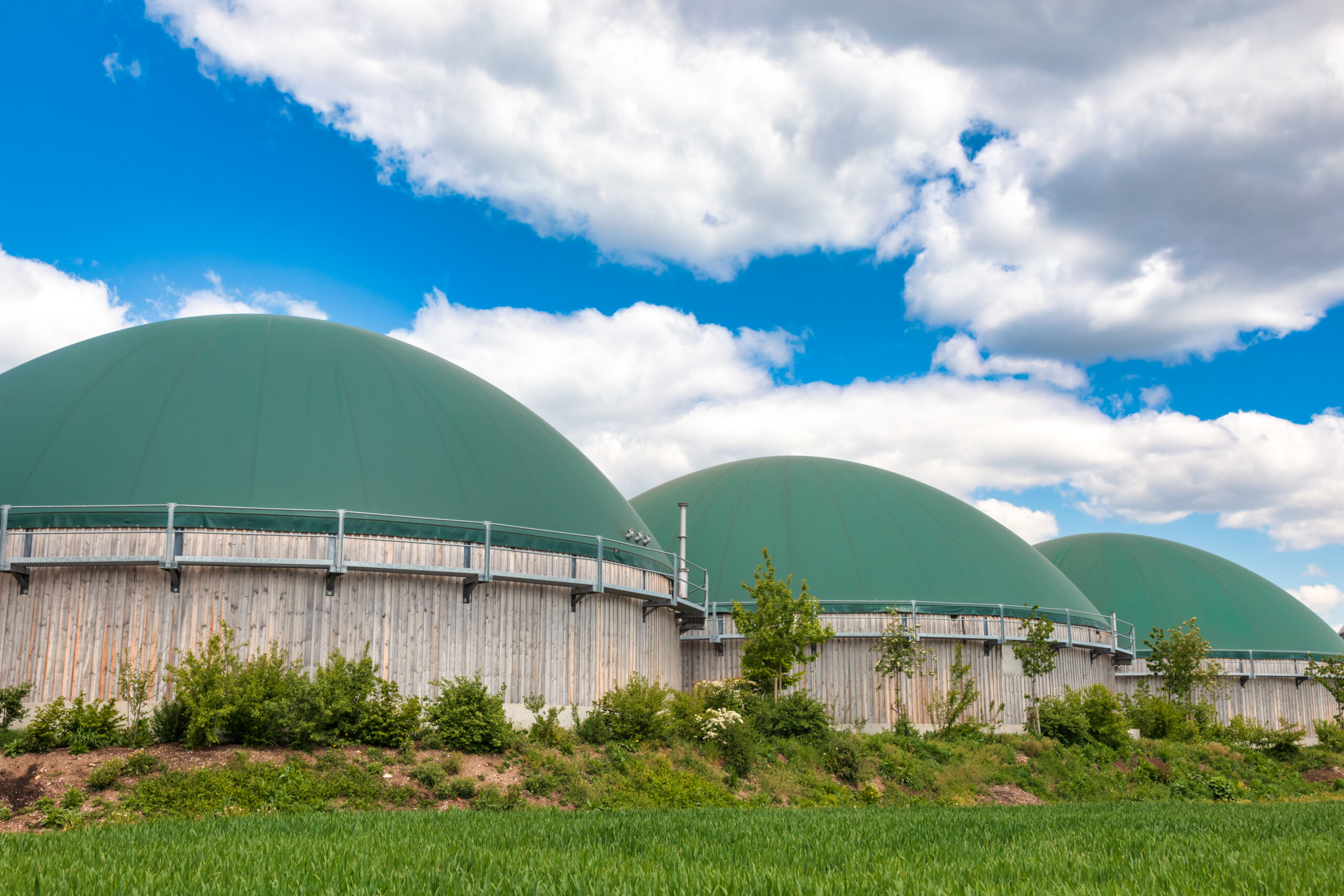NW Natural is linked to another overseas trip for lawmakers to learn about biogas production, something that interests the state’s biggest gas company as it faces a state mandate to cut emissions.
Three state lawmakers – Republican Rep. Virgle Osborne of Roseburg, Republican Sen. David Brock Smith of Port Orford and Democratic Sen. Mark Meek of Gladstone – will go to Denmark from April 15 to 20 to learn more about the production of hydrogen gas and biogas, a fuel created through the breakdown of organic matter. The chief of staff for Democratic Rep. Ken Helm of Beaverton – Greg Mintz – is also on the guest list. The Danish government aims to phase out natural gas for heat and electricity by 2030, and to replace it with biomethane, which is made mostly by capturing methane gas from decaying crops, plant and animal waste and using it for energy.
The tour of Danish gas facilities is the second such trip in less than a year. Seven months ago, NW Natural paid for five Oregon lawmakers to visit Denmark on a similar trip that included a NW Natural lobbyist. That lobbyist, Nels Johnson, said in paperwork filed with the Oregon Government Ethics Commission that NW Natural would not be funding this trip. Johnson sought the commission’s approval for the trip, calling it a fact-finding mission. Lawmakers will be given scholarships to attend through the Seattle-based touring company i-Sustain, a private corporation.
“Given the Oregon Legislature’s focus on decarbonization, this trip will prove hugely informative to lawmakers as they continue to think through Oregon’s decarbonization efforts,” Johnson wrote in his request to the commission, which was approved on Monday.
Johnson said in his ethics request that the i-Sustain scholarships would be funded largely by labor unions and utilities, which the ethics commission did not verify.
Representatives from NW Natural and Johnson did not respond to emails asking for more information from the Capital Chronicle. Patricia Chase, founder of i-Sustain, responded to the Capital Chronicle in an email but did not respond to a question about the company’s funding.
Environmentalists have criticized the trips. They say NW Natural is trying to convince lawmakers that biofuels could be a viable part of the company’s fuel mix even though regulators disagree. They are expensive and not well-developed in the U.S.
NW Natural faces a state mandate to cut emissions by more than a quarter by 2050. The state’s utilities regulators have told the company, along with Avista and Cascade Natural Gas, that they will not meet that target by relying solely on biogases and biomethane, which are currently in their infancy in the U.S., expensive to produce and controversial. Critics say biomethane promotes the growth of confined animal operations, which provide a substantial amount of manure to make the gas and are emissions intensive, and that biomethane still burns as methane, warming the planet. Other low and zero emission energy sources, such as wind and solar, do not.
Members of the nonprofit environmental group Sierra Club have called on lawmakers to stop taking the trips to Denmark, in large part because NW Natural has played a role in funding and coordinating them.
“It is outrageous that the gas industry continues to fund these misleading junkets overseas to peddle false solutions like biomethane to lawmakers and regulators,” said Dylan Plummer, an organizer with the Sierra Club, in a statement. “We are calling on public servants across the region to reaffirm their commitment to climate justice and say no to these fossil fuel funded vacations.”
Gas money
The trip to several biogas and hydrogen facilities in Denmark last September cost NW Natural about $6,200 per legislator, according to reporting from the Malheur Enterprise, and the company selected the legislators who were invited: Sen. Janeen Sollman, D- Hillsboro; Sen. Lynn Findley, R-Vale; Rep. Mark Owens, R-Crane; Rep. Bobby Levy, R-Echo; and Rep. Emerson Levy, D-Bend. Findley and Owens each received $2,500 campaign donations from NW Natural’s political action committee just days before departing on the trip, according to the Enterprise.
The upcoming April trip, titled “Decarbonizing the Gas Grid: Lessons from Denmark” is almost a carbon copy of the September trip. It, too, includes visits to several hydrogen gas and biogas production facilities, a tour of a Meta, formerly Facebook, data center, a meeting with a metal workers union and a tour of a hotel powered by geothermal energy.
Among those selected for the tour are people of considerable power when it comes to state natural resource and energy policy. Helm, Mintz’s boss, is chair of the House Committee On Agriculture, Land Use, Natural Resources and Water and a member of the House Committee on Climate, Energy and Environment. Osborne is also a member of the climate and energy committee. Meek and Brock Smith serve on powerful budget writing, economic development and natural resources committees. Brock-Smith was the lone lawmaker to ask personally for permission from the Government Ethics Commission to join the trip.
These lawmakers don’t appear to have accepted major contributions from NW Natural’s political action committee, or PAC, in recent weeks. The PAC did however give $1,000 to Brock Smith’s campaign in late January and, on the same day, a $1,000 donation to the Senate Democratic Leadership Fund run by Sen. President Rob Wagner, D-Lake Oswego, and Senate Majority Leader Kate Lieber, D-Beaverton, to support Democratic candidates in state senate races.
Helm said in an email that he sees no issue with his chief of staff joining the trip. He said the ethics commission sanctioned the trip and that Mintz’s participation is critical to his understanding of a decarbonized energy system.
“I serve on multiple legislative committees for which energy and decarbonization are important topics. It is essential that my staff and I continue to build our knowledge in these complex areas,” Helm said.
Study abroad for lawmakers
The company taking the lawmakers to Denmark, i-Sustain, bills itself as a backer of high-intensity study abroad trips for politicians and business leaders hoping to learn about sustainable energy, waste and transportation solutions.
It was founded by Patricia Chase in 2002, and, according to its website, includes one other employee, Jayson Antonof, principal and technical lead. The company’s address is a condo in downtown Seattle, according to business filings with the Washington Secretary of State’s Office. On its website, the company says it works closely with a Danish-American intercultural foundation, but the company’s finances are private.
The Seattle company is not registered in Oregon as a lobbyist. State law requires registration of anyone who tries to influence lawmakers by providing “personal services for money” or “as a representative of a corporation, association, organization or other group.”
“It is certainly possible that i-Sustain would need to register, either as a lobbyist or, if they have a registered lobbyist, as the client, per the requirements,” the ethics commission director, Susan Myers, told the Capital Chronicle.
Chase told the Capital Chronicle via email she did not have time to talk, but that since founding the company her goal has been to get influential public, business, labor and nonprofit leaders together to share best practices in sustainable development.
“Some have been critical of our study tours because they bring together special interests with policy leaders, but it is clear that doing so has greatly improved the livability and environmental footprint of the cities we work with,” she wrote.
“The country we visit most is Denmark. In addition to the country being the global leader in technology, policies and practices related to climate change, it has a philosophy of inclusion and consensus that, while foreign to our often adversarial approach, is much more effective at making positive, long lasting change,” she said.
Environmentalists skeptical
Oregon environmentalists say that taking lawmakers to Denmark obscures the challenges faced by NW Natural and the state’s natural gas utilities. Denmark is well on its way to eliminating natural gas as an energy source but that’s not the case in Oregon or the rest of the U.S.
The Danes plan to stop using natural gas entirely. But NW Natural proposes blending natural gas with biogases and hydrogen. That approach was part of the company’s latest proposed plan to meet its emissions mandate that was rejected this month by the Public Utility Commission.
There’s also another key difference between Denmark and the U.S. and Oregon: In the U.S., about 43% of electricity is powered by natural gas, with Oregon depending on natural gas for about 30% of its total electricity generation. Denmark only uses natural gas for 6% of its electricity. Eighty percent comes from renewable sources such as wind, solar and biofuels like burning wood pellets and garbage. Environmentalists would like to see Oregon and the U.S. move toward more electricity powered by zero-emissions solar and wind energy, rather than natural gas or biofuels.
“The gas industry has long hailed biomethane as a silver bullet for their emissions despite the fact that it is expensive, scarce and just as harmful to public health and affected communities as fossil methane,” Plumber, of the Sierra Club, said in an email. “Countless studies have shown, and regulators agree, the most cost-effective solution to the emissions associated with the gas system is to quickly electrify homes and buildings, not prop up the gas system with false promises like biomethane.”
GET THE MORNING HEADLINES DELIVERED TO YOUR INBOX










